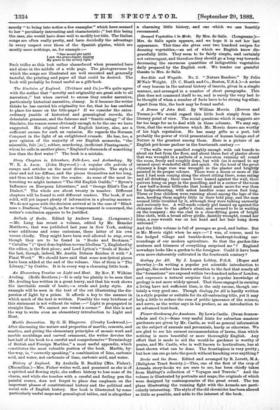A Dream of John Ball. By William Norris. (Reeves and
Turner.)—We would regard this little book simply from the literary point of view. The social questions which it suggests are far too large for us to deal with in these columns. We may say, then, that the word-pictures which Mr. Morris draws are worthy of his high reputation. He has many gifts as a poet, but probably the power of vivid presentation of human beings and of Nature is the greatest among them. Here is a picture of an English pot-house parlour in the fourteenth century :- " The walls were panelled roughly enough with oak boards to about six feet from the floor, and about three feet of plaster above that was wrought in a pattern of a rose-stem running all round the room, freely and roughly done, but with (as it seemed to my unused eyes) wonderful skill and spirit. On the hood of the great chimney a huge rose was wrought in the plaster and brightly painted in its proper colours. There were a dozen or more of the men I had seen coming along the street sitting there, some eating and all drinking; their cased bows leaned against the wall, their quivers hung on pegs in the panelling, and in a corner of the room I saw half-a-dozen billhooks that looked made more for war than for hedge-shearing, with 'ashen handles some seven foot long. Three or four children were running about among the legs of the men, heeding them mighty little in their bold play, and the men seemed little troubled by it, although they were talking earnestly and seriously too. A well-made comely girl leaned np against the chimney close to the gaffer's chair, and seemed to be in waiting on the company : she was clad in a close-fitting gown of bright blue cloth, with a broad silver girdle, daintily wrought, round her loins, a rose wreath was on her head and her hair hung down unbound."
And the little volume is full of passages as good, and better. But is Mr. Morris right when he says :—"I was, of course, used to the hedged village and tumble-down, bankrupt-looking sur- roundings of our modern agriculture. So that the garden-like neatness and trimness of everything surprised me " P England nowadays looks like a garden to the foreigner. Could it have been even more elaborately cultivated in the fourteenth century ?






































 Previous page
Previous page